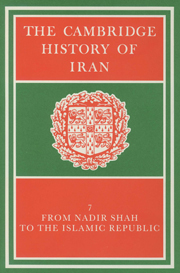Book contents
- Frontmatter
- PART 1 THE POLITICAL FRAMEWORK, 1722–1979
- PART 2 FOREIGN RELATIONS
- 8 IRANIAN RELATIONS WITH THE OTTOMAN EMPIRE IN THE EIGHTEENTH AND NINETEENTH CENTURIES
- 9 IRANIAN RELATIONS WITH RUSSIA AND THE SOVIET UNION, TO 1921
- 10 IRANIAN RELATIONS WITH THE EUROPEAN TRADING COMPANIES, TO 1798
- 11 IRANIAN RELATIONS WITH GREAT BRITAIN AND BRITISH INDIA, 1798–1921
- 12 IRANIAN FOREIGN POLICY, 1921–1979
- PART 3 ECONOMIC AND SOCIAL DEVELOPMENTS
- PART 4 RELIGIOUS AND CULTURAL LIFE, 1721–1979
- Genealogical tables
- Bibliographies
- Index
- References
9 - IRANIAN RELATIONS WITH RUSSIA AND THE SOVIET UNION, TO 1921
from PART 2 - FOREIGN RELATIONS
Published online by Cambridge University Press: 28 March 2008
- Frontmatter
- PART 1 THE POLITICAL FRAMEWORK, 1722–1979
- PART 2 FOREIGN RELATIONS
- 8 IRANIAN RELATIONS WITH THE OTTOMAN EMPIRE IN THE EIGHTEENTH AND NINETEENTH CENTURIES
- 9 IRANIAN RELATIONS WITH RUSSIA AND THE SOVIET UNION, TO 1921
- 10 IRANIAN RELATIONS WITH THE EUROPEAN TRADING COMPANIES, TO 1798
- 11 IRANIAN RELATIONS WITH GREAT BRITAIN AND BRITISH INDIA, 1798–1921
- 12 IRANIAN FOREIGN POLICY, 1921–1979
- PART 3 ECONOMIC AND SOCIAL DEVELOPMENTS
- PART 4 RELIGIOUS AND CULTURAL LIFE, 1721–1979
- Genealogical tables
- Bibliographies
- Index
- References
Summary
Before the 18th century relations between Iran and Russia were sporadic. Though some Persian goods found their way to Muscovy while the duchy was still under the Tatar yoke, travel and commerce remained insignificant until the mid 16th century, when the Russian conquest of the khanates of Kazan and Astrakhan opened the Volga route to the Caspian Sea. Soon Moscow became a minor entrepôt for Europe's Persian trade. From the north and the west there flowed into Iran a small stream of furs, cloth, metals, leather, amber, crystal. From Iran came silk, pearls, rugs, embroidered cloth, velvet, rice, fruit, and spices.
Political and diplomatic relations between the two states were less important. After a brief clash of interests in Dāghistān early in the 17th century, the Russians withdrew from the northern Caucasus. The raids on Iran's shores by Sten'ka Razin's cossacks were a large-scale bandit enterprise conducted against the wishes of Russian authorities. Razin's mobs pillaged coastal towns, indiscriminately massacred their inhabitants, raped and abducted women, then disappeared without trace. Occasionally Muscovite envoys would appear in Isfahān or Persian envoys in Moscow, but the contacts they established were of short duration. It was Peter the Great who broke through the barrier of the Caucasus and for the first time confronted Iran with the Russian threat.
Though Peter I was primarily concerned with Europe, “he had from his earliest years taken a lively interest in Asia”. In him, B. H. Sumner has written, “The enthusiasm of the explorer was allied with the gold-dazzled phantasy of the prospector and the merchant.”
- Type
- Chapter
- Information
- The Cambridge History of Iran , pp. 314 - 349Publisher: Cambridge University PressPrint publication year: 1991
References
- 4
- Cited by



